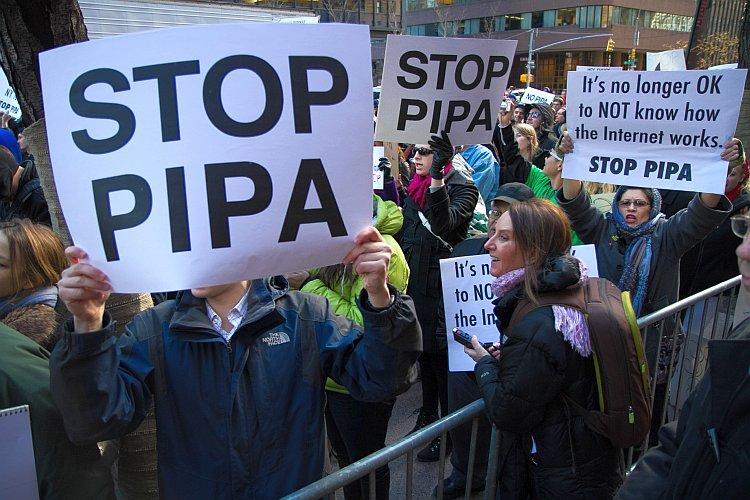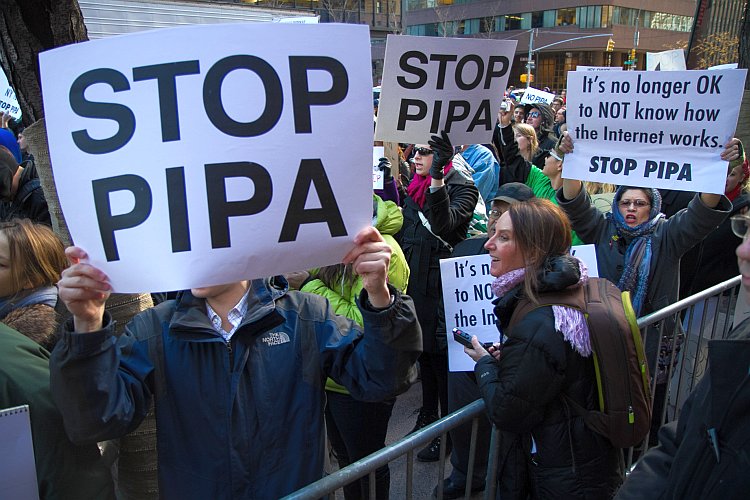The U.S. Internet community had a win last week when major websites united with supporters of Internet freedom and succeeded in halting the passage of two controversial Internet antipiracy bills. In one of the most substantial clashes of generational cultures to date, the battle may be just beginning.
The two bills, the Stop Online Piracy Act (SOPA) and the PROTECT IP Act (Preventing Real Online Threats to Economic Creativity and Theft of Intellectual Property Act of 2011), would enable the U.S. Department of Justice and copyright holders to shut down websites that violate intellectual property or sell counterfeit goods.
Proponents of the bills argue that piracy on the Internet from foreign companies is rife, cutting into profits and causing job losses. Supporters include the U.S. Chamber of Commerce and big names in the pharmaceutical, media, entertainment, and fashion industries, among them Chanel, Ralph Lauren, Kate Spade, Tiffany & Co., CBS, The Walt Disney Company, Time Warner, Harley-Davidson Motor Company, and Nike, according to a list of over 70 companies published by Google.
Those against the SOPA and PROTECT IP bills argue that Internet freedom is fundamental to communication, innovation, and job creation in the 21st century, and that the legislation, while claiming to target foreign companies, is flawed in handing wide-ranging powers to corporations over U.S.-based tech companies.
Tiffany Cheng, spokesperson from Internet freedom group fightforthefuture.org articulated the divide. She acknowledged that there were legitimate concerns about piracy but sees the legislation representing more about the challenge new technology poses to big business than solving the piracy problem.
“This has become a fundamental struggle [in] how the communication platform we call the Internet is open to people everywhere to express themselves freely or it becomes a playground for corporate holders to shut off at their will,” she told The Epoch Times.
Postponed Indefinitely
Fightforthefuture was one of the many groups that took to the streets and the Internet around the world to protest the legislation, Jan 18. Over 10,000 websites participated in the protest, including the world’s largest website Google, which posted a black banner opposing the bill, plus Wikipedia and Craigslist which temporarily shut down for the day, posting only criticisms of the bill.
Even the White House issued a statement cautioning lawmakers about censorship of lawful activity which could result in dampening the dynamic tech industry.
President Obama “will not support legislation that reduces freedom of expression,” White House spokesman Jay Carney told White House reporters.
In the wake of the onslaught, lawmakers backed down. Senate Majority Leader Harry Reid told reporters more information on the subject had come to light as a result of the protests.
“In light of recent events, I have decided to postpone Tuesday’s vote on the PROTECT IP Act,” Reid tweeted.
Rep. Lamar Smith, a Republican from Texas, who pushed for the Bill in the House, also backed down saying in a statement: “It is clear that we need to revisit the approach on how best to address the problem of foreign thieves that steal and sell American inventions and products.”
The SOPA markup was scheduled to resume on Feb. 18, but it has now been postponed, indefinitely according to nonprofit nonpartisan website, OpenCongress.
It will not however be the end of the issue.
Generational Differences
Christopher Dodd, the chairman and CEO of the Motion Picture Association of America (MPAA) issued a statement following the protests, calling the blackouts a “gimmick.” He warned that failing to act will provide “a safe haven for foreign thieves; American jobs will continue to be lost; and consumers will continue to be exposed to fraudulent and dangerous products peddled by foreign criminals.”
Chairman Dodd indicated the push for action would continue, saying it was now “incumbent” on critics to work with proponents of the bill to deliver “a meaningful solution to this critically important goal.”
While the tech companies will welcome being included at the discussion table, there remain fundamental concerns about the way big business went about drafting the bills.
Tiffany Cheng noted that Internet watchdogs and tech companies had had little input into that process, adding that, in the rare times they had been invited to contribute, their concerns were ignored.
Questions have also been raised about the claims that piracy has been the cause of big job losses in the U.S. entertainment and music industries.
Julian Sanchez, an IT specialist for D.C.-based think tank Cato Institute, says that while piracy might have had an impact a decade ago, when there were few venues to download legally and people still bought hard copies of movies and films, there is little evidence that it is having the catastrophic consequences described by the music and entertainment industries.
He refers to a report from the Government Accountability Office, which concludes that the effects of piracy are nearly impossible to quantify, and points to a survey conducted in November last year by the International Intellectual Property Alliance, which found the movie and entertainment industry had lost some jobs but “compared with the rest of the economy, employment seems to have held relatively stable.”
Sanchez says online infringement is a concern but suggests that, rather than creating unwieldy and costly restrictions on the tech industry, it would be better “to make content easily available online at an attractive price,” he writes on the Cato Institute website.
Ben Huh, the CEO of Cheezburger, a network of 50 websites, says the two sides of the debate represent very different views of the Internet.
“There’s a fundamental difference between people who want to see the Internet and say let’s lobotomize and censor parts of it because we need to control it, and those like us who see the Internet as a method of growing the economy and innovating in front of the world,” he told PBS.
Tiffany Cheng said the issue can also been seen as a clash of generations. Legislation could prevent a range of activities that have become second nature to her generation, like live streaming and recording of events, and even karaoke.
Then there is “the silent damage effect,” she says. “The young YouTube that we would never have the experience of knowing about, because they just can’t start up.”
Ms. Cheng says that although she is not keen to define the issue as an age difference, she believes people who have not grown up with the Internet as their main mode of communication just “don’t quite get” how the Internet has become “this main platform for culture sharing,” nor “how much public experience comes out of an open and vibrant Internet system.”






